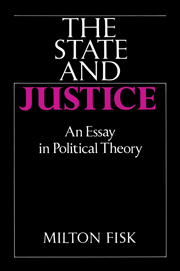Book contents
- Frontmatter
- Contents
- Preface
- Introduction: Can the state rule without justice?
- Part One An outline of a materialist political theory
- Part Two An assessment of the place of justice in the state
- Part Three A functional view of political institutions
- Part Four An account of the community of states
- 17 Global justice
- 18 The imperial state
- 19 Peace through strength
- 20 The Soviet Union as other
- Part Five A reflection on the transition to a new kind of state
- Conclusion: State, class, and democracy
- Notes
- Index
19 - Peace through strength
Published online by Cambridge University Press: 06 July 2010
- Frontmatter
- Contents
- Preface
- Introduction: Can the state rule without justice?
- Part One An outline of a materialist political theory
- Part Two An assessment of the place of justice in the state
- Part Three A functional view of political institutions
- Part Four An account of the community of states
- 17 Global justice
- 18 The imperial state
- 19 Peace through strength
- 20 The Soviet Union as other
- Part Five A reflection on the transition to a new kind of state
- Conclusion: State, class, and democracy
- Notes
- Index
Summary
Since the Reagan–Gorbachev meeting in Reykjavik in October 1986, some steps have been taken toward arms reduction. It will, though, take more than this to end the forty-year military competition between their countries. Whether with more or with less arms, each country competes with the other for the edge in military strength it can then use to further its goals. An important aspect of the imperial state is revealed by this competition between the United States and the USSR. There have been many attempts to see the competition as grounded in the nature of the state. But in fact it is within the context of the imperial state, rather than of the modern state in general, that the military competition has its roots.
The partial rule of an imperial state over the outposts of its empire requires imperial justice with its double aspect of prosperity and peace. In regard to prosperity, the benefits the imperial state gets from its empire are to be balanced with economic development in the states it dominates. In regard to peace, the imperial state's potential for protecting itself with unmatchable military might has as a complement a military umbrella that brings peace to the outposts of its empire. I am concerned in this chapter with this second aspect of imperial justice and how it is undercut by imperialist rivalries. I shall argue that the military competiton of the period after World War II is not a freak phenomenon since it flows from the interaction of imperial states.
- Type
- Chapter
- Information
- The State and JusticeAn Essay in Political Theory, pp. 246 - 258Publisher: Cambridge University PressPrint publication year: 1989



